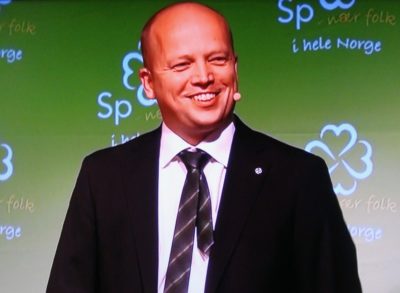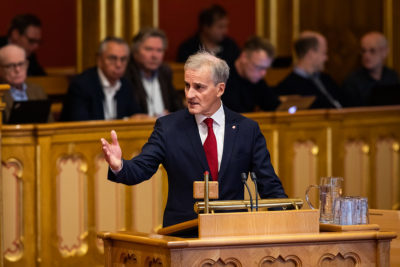NEWS ANALYSIS: “Prime Minister Trygve Slagsvold Vedum? Get used to the thought.” That was just one political commentator’s response after results of a new public opinion poll show Vedum’s Center Party as bigger than the currently ruling Conservatives and breathing down the neck of the Labour Party. That’s created what a leading election analyst calls “an entirely new political reality” in Norway.

The stunning results of the poll still rank Labour as Norway’s single largest party, but now with only 21.7 percent of the vote. That’s down from 27.4 percent in the last parliamentary election in 2017.
Norway’s second-largest political party in the new poll is no longer the Conservatives, which slid 2.3 points to just 20.6 percent of the vote. Instead it’s the Center Party, which rose another 2.2 points to command 20.9 percent. It marks a milestone for Center, which has never crossed over the 20-percent mark and now has the largest voter support since its beginnings as Bondepartiet (the Farmers’ Party) in the early 1900s.
The poll was conducted by research firm Opinion for newspaper Dagsavisen, its ownership group ANB and the labour movement’s news service FriFagbevegelse. “If this had been an election result, it would create an entirely new situation in Norwegian politics,” Johannes Bergh, who specializes in election analysis at Norway’s Institute for Social Research, told FriFagbevelse.
That’s because the poll results suddenly pose a challenge not only to Norway’s current Conservative coalition government but also to the balance of power within the left-center coalition made up of Labour, Center and the Socialist Left party (SV). With Center now nearly as big as Labour, it would be in a position to demand just as many ministerial posts as Labour, and Vedum could even challenge Labour leader Jonas Gahr Støre for the prime minister’s post.
Conservative coalition collapsing
It’s already a political reality that the center-left parties are gearing up to thwart Conservative Prime Minister Erna Solberg’s second bid for re-election of her non-socialist coalition in 2021. Earlier polls also indicate the center-left may have an easier time doing that, after losing to her coalition in 2013 and again in 2017. Not only has her party slipped in the polls (from 25 percent of the vote in 2017), its more conservative partner, Progress Party, has utterly collapsed and now only holds 8.9 percent. Their two other coalition partners are both doing miserably as well, with the Liberals down to just 3 percent and the Christian Democrats at 3.8 percent in the new poll. That leaves them under the magic 4 percent needed for full representation in Parliament.

Most of the parties on the left side of Norwegian politics, meanwhile, are doing well, with SV nearly as big as Progress is now at 8.4 percent of the vote, the surging Greens at 6.5 percent and the Reds at 4.4 percent. The new poll gives the left-center parties a majority on their own, with 51 percent, and nearly 62 percent if they can also win support from the Greens and the Reds who’ve never committed to a coalition. The Reds don’t even want government power, since the necessary compromises on issues might force them to abandon principles.
There wasn’t great cheering on Thursday, however, when the poll results came out. Even Vedum, who’s often personally accused of populist tactics to win votes, was restrained, stressing to FriFagbevegelse that polls “can go up and down” and that “we never take any votes for granted.”
Vedum acknowledged that “if we have an even better election (than recent local elections, when Center did well around the country) we’ll get more seats (in Parliament)” and therefore be more likely to see its policies prevail. Despite comments of “a new reality” and political commentator Arne Strand’s assessment in Dagsavisen Thursday that Norwegian politics “are at a crossroads,” Vedum thinks any talk of a prime minister battle between him and Støre “derails” the debate.
“We’re happy about a good poll and will keep working,” Vedum said.
Støre struggling to succeed
Labour, however, risks losing power even if the left side wins in 2021. Støre still hasn’t emerged as a clear leader who can win voters’ hearts and minds. Labour itself is also torn between its longtime allegiance to the oil industry and other job-generating industrial pursuits at a time when voters are clamouring for more climate-friendly policies. That points up one of the surprises behind the Center Party’s strong showing in the new poll: Center is not viewed as particularly concerned about the climate or as an environmentally friendly party. It firmly supports oil, has opposed creation of national parks, promotes its farming consitutency’s meat industry, and launches regular efforts to shoot wolves that threaten sheep and lambs released for free-range grazing. The party also has been behind several efforts to halt measures aimed at reducing use of private cars.

Center has scored points, though, on defying the government’s unpopular forced mergers of counties and municipalities, its consolidation of public services and reforms of police and hospitals. It has lured voters away from the Progress Party and even tried to do so again this week by proposing lower taxes on gasoline and diesel. Researcher Bergh further notes that Labour “hasn’t managed to mobilize” its current role as leader of the opposition in Parliament. Both Center and the Greens have profited from that.
Commentator Strand of Dagsavisen agrees that Vedum “has been a better opposition leader” than Støre, but cautioned how “that doesn’t make him necessarily a better prime minister. In that job there are many qualities that apply, not least earlier experience as a leader and ability to get a government with several parties to work together.” Strand further stressed that “no one can call into doubt Støre’s diplomatic abilities as a foreign minister (for six years, under current NATO chief Jens Stoltenberg).”
Bergh thinks it’s just a matter of time before Center emerges as the largest party in Norway. That shows just how fragmented Norwegian politics have become, not least if the three biggest all hold around 20 percent of the vote, and it can shake up long-standing policies. Center, for example, has always opposed not only EU membership but also Norway’s current trade and policy agreement with the EU, which both Labour and the Conservatives firmly support.
The biggest irony, perhaps, is how the Conservative coalition’s loss of support is in many ways a problem for Labour. The party had little comment on the “new reality,” with Labour’s deputy leader Hadia Tajik responding that the poll results “motivate us to work for more voter confidence. The poll shows there is a clear majority to shift out the current government, and that gives us extra motivation.”
newsinenglish.no/Nina Berglund

